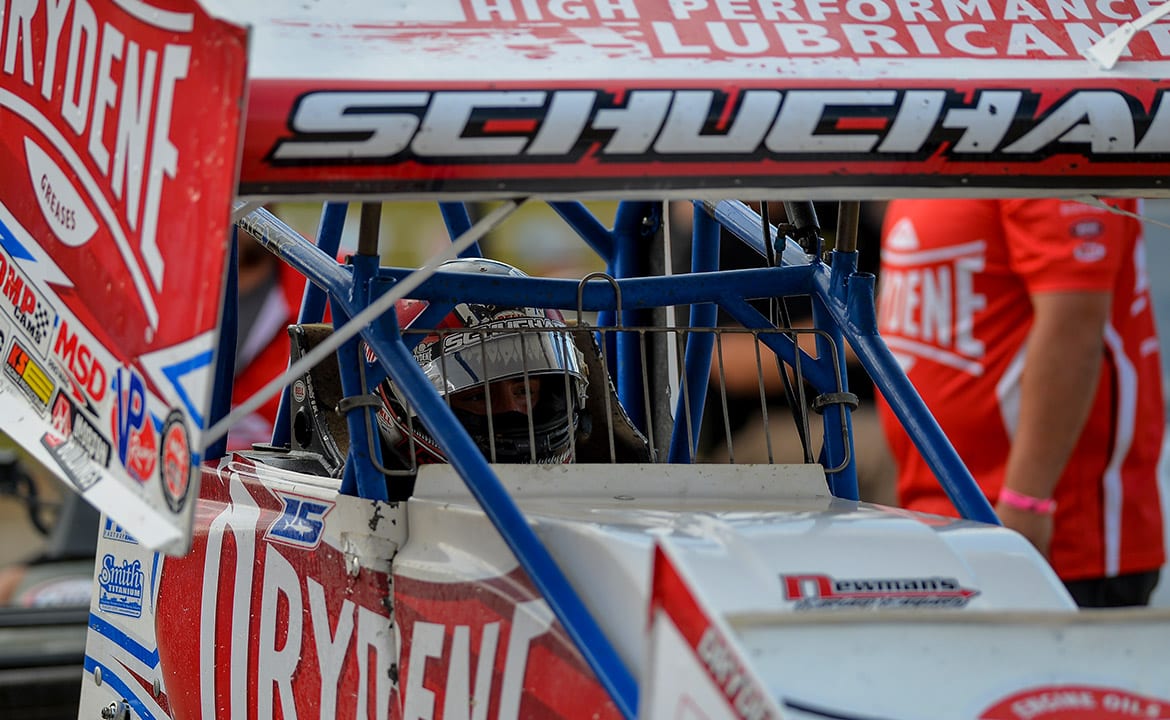CONCORD, N.C. – Elevated in an atmosphere of drifting confetti, an exultant Logan Schuchart stood atop his winged chariot, throwing his arms in the air.
From below, his Drydene-clad crew members cheered with the same energy and enthusiasm.
The Shark Racing team won their fourth World of Outlaws NOS Energy Drink Sprint Car Series race of the year at River Cities Speedway on June 7 – becoming the winningest team of the year so far.
While the accolade took minutes to celebrate, hours and days of preparation and hard work went into achieving their few minutes of fame.
“It’s a good two full days (of work),” Schuchart said. “Eight hours each day. We usually start at nine or 10 (in the morning) and work until five, six in the afternoon.”
Work for Friday’s race at River Cities Speedway started Wednesday afternoon in the back parking lot of the Grand Forks, N.D., Canad Inns.
It was less than 24 hours after the Tuesday night race at Fairbury Speedway in Fairbury, Ill. – about a 12 hour drive to Grand Forks.
The team’s No. 1a and No. 1s cars were rolled out of the trailer to an empty parking lot and attended to by each car’s three-man crew – including drivers Jacob Allen and Schuchart.
Some teams have the budget for a four-man crew of a driver, crew chief, car chief and tire specialist. But for Shark Racing, Allen and Schuchart get their hands just as dirty as the rest of the crew.
Day one of preparation started with a wash. Each car was stripped down, and pressure washed to remove the dirt from the night before. Then, regular maintenance, which continued on through Thursday and the beginning of race day.
“There’s maintenance we’ll do from one race to the next, like over the weekend from a Friday to a Saturday. But usually during the week, we’ll do a little more extensive maintenance to the cars,” said Tyler Garber, car chief for Allen.
There’s not an area of the car that doesn’t get touched. Teams will take the top end of the engine apart, clean it and make sure everything, such as the valves, is working properly. Garber said they’ll do an oil change and install new spark plugs, as well.
The rear end will be removed and inspected, and the birdcage greased. The front end receives the same treatment. It’s checked over for bent parts and the hinges are greased.

To keep track of what needs to be done, both Schuchart and Allen have their own checklist posted on the inside of the team’s trailer. It lists what needs to be changed and when, how many races each part has on it, when the last oil change was, when the birdcage was greased last and how long the rear end has been in the car.
“That’s how we stay organized,” Schuchart said.
Along with the car, the team’s trailer needs to be kept clean and organized, too, Garber said.
Some days, it’s simple work. Other days, like the day before the race at River Cities Speedway, it can become complicated.
Schuchart said the team found broken valve springs and bent torque tubes.
“Some days are easy, and some there’s a lot more going into it,” Schuchart said. “Everybody’s car might be different. But once you race for so long, you kind of know your car and what needs more attention than others.”
To continue reading, advance to the next page.
